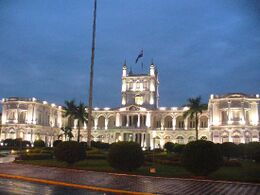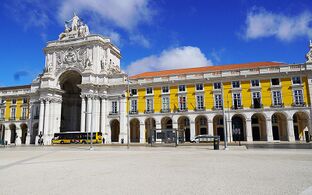Government of Pelaxia
The Government of Pelaxia operates under the framework of a federal, parliamentary republic as outlined in its National Constitution. Each province is empowered to establish its own constitution with a parliamentary system in alignment with the principles of the National Constitution. At the national level, the legislative branch consists of the Federal Parliament, comprising the Chamber of Deputies and the Senate, responsible for passing legislation in accordance with the National Constitution. The executive power is vested in the Federal Chancellor, who appoints the Prime Minister elected by Parliament. Judicial authority is exercised by the Federal Supreme Court of Justice, federal courts, provincial courts, and municipal tribunals. Pelaxia is divided into 19 provinces, 1 Autonomous Community, and 1 Autonomous Region, each with its own government structure, including elected representation to the Federal Parliament and autonomous administrations. Provinces have governors, unicameral or bicameral legislative bodies, and independent courts of law. Pelaxian regions, while mainly geographical divisions, influence the distribution of federal funds and development projects. Comarcas, such as the Albalitorian Metropolitan Area (AMAL), represent administrative units formed to address the evolving needs of growing metropolitan areas, with the Ciudad Comarca de Albalitor (CICAL) as a notable example.
-
Palacio de Escorrecho.
-
"The Regia", the Pelaxian Parliament.
-
Raúl Monzón, Prime Minister of Pelaxia.
-
Matías Mexes, Federal Chancellor of Pelaxia.
-
Federal Supreme Court of Justice Palace.
National Constitution and Legal Basis
According the the National Constitution's 2nd article: The Federal Republic of Pelaxia adopts for its government the structure of a federal, parliamentary republic. Every province shall disctate its own Constitución with a parliamentary system in accordance with the principles, declarations and guarantees of the National Constitution.
- Legislative: The federal legislative power institutionalized in the Federal Parliament is composed of two chambers. One chamber of deputies that represents the whole people and one chambers of senators that represents the provinces. Deputies serve for a period of 5 years while senators serve for a period of 6 years. Members of the Federal Parliament (both deputies and senators) are elected in general, direct, free, equal and secret elections. They shall be representatives of the whole people, not bound by orders or instructions, and responsible only to their conscience. The Federal Parliament shall pass legislation in accordance to the National Constitution.
- Executive: The federal executive power is Federal Chancellor, who appoints the Prime Minister elected by Parliament. The Prime Minister is elected by the Federal Parliament until he loses the support of solely the Chamber of Deputies.The person who receives the votes of a majority of the Members of the Chamber of Deputies shall be elected and appointed. The Federal Chancellor shall appoint his/her members of the cabinet. The Federal Chancellor is elected by direct popular vote every 6 years.
- Judicial: The judicial power is vested in the judges; it is exercised by the Federal Supreme Court of Justice, by the federal courts provided for in the National Constitution, by provincial courts and by municipal tribunals.
The political philosophy underlying the political structure of Pelaxia is deeply rooted in republicanist political theory, which emphasizes the principles of civic virtue, popular sovereignty, and decentralized governance. Pelaxia's geographical and historical context, particularly the dispersion of regions and population across the Pelaxian Valley, fosters a strong sense of local and regional identity. This dispersion encourages a political system that values local autonomy and empowers communities to govern themselves according to their distinct needs and values. Throughout Pelaxia's history, the political debate has been shaped by the tension between national central governance and federal autonomy. This tension reflects the inherent struggle between the need for a strong central authority to maintain unity and coherence across the nation and the desire for regional autonomy to preserve local identities and traditions.
At times, advocates for a strong central government have argued that a unified approach is necessary to address national challenges and promote economic development and social cohesion. They have emphasized the importance of a centralized authority in ensuring uniformity in laws, policies, and infrastructure projects across the country.
On the other hand, proponents of federal autonomy have championed the rights of provinces to govern themselves according to their unique needs and priorities. They have argued that decentralizing power allows for greater responsiveness to local concerns, fosters innovation and experimentation in governance, and promotes a sense of ownership and participation among citizens. The clash between national central governance and federal autonomy has led to significant political debates and conflicts throughout Pelaxia's history. These debates have often centered on issues such as the allocation of resources, the distribution of tax revenues, the division of powers between the federal government and the provinces, and the protection of minority rights.
Executive Branch
Of the Federal Chancellor and Prime Minister
The Executive Power of Pelaxia is centered on the figure of the Federal Chancellor who appoints the Prime Minister elected by Parliament. The Prime Minister is elected by the Federal Parliament until he loses the support of solely the Chamber of Deputies. The person who receives the votes of a majority of the Members of the Chamber of Deputies shall be elected and appointed. The Federal Chancellor shall appoint his/her members of the cabinet. The Federal Chancellor is elected by direct popular vote every 6 years.
The Chancellor concentrates the executive and representative powers of the Nation towards the outside as well as being the figure in command of the Armed Forces. He signs the laws approved by the Federal Parliament, as well as has veto power over them. He signs the "Decree Laws" proposed by the Prime Minister, as well as having the ability to reject them. There are no mechanisms that can invest him nor can he invest himself with powers that provide him with powers over social, tax, political-party and/or economic policy, since the development of these powers falls on the Prime Minister. It also cannot depose a Prime Minister and only dissolves Parliament if it is unable to form a government during a specific period.
The Prime Minister is the executor of the powers of the Executive Branch as a government in the name of the Federal Chancellor, after being elected by the Federal Parliament. He appoints his cabinet which is approved by the Chancellor.





